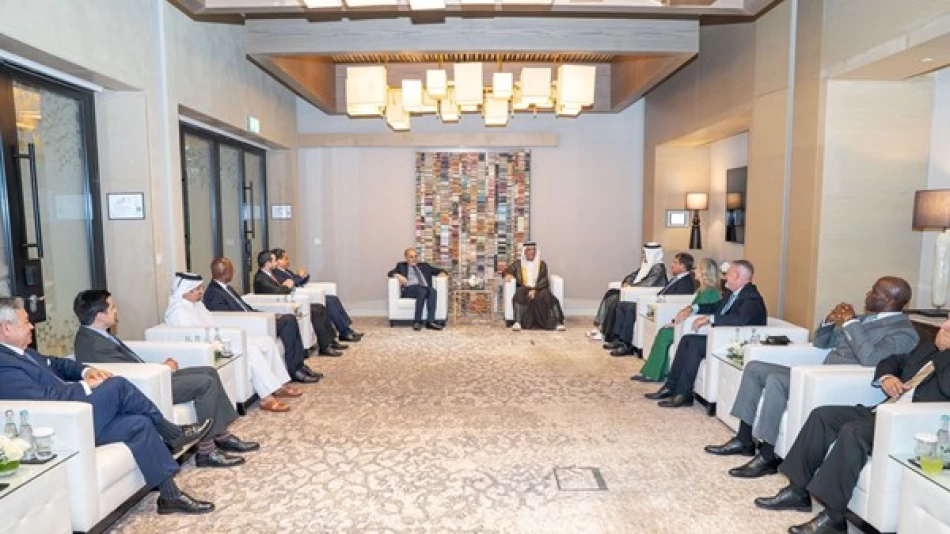
Ras Al Khaimah Hosts Central American Independence Celebrations Witnessed by Saud bin Saqr
UAE Strengthens Central American Ties as Regional Diplomacy Takes Center Stage
The UAE is deepening its diplomatic engagement with Central America, as Ras Al Khaimah's ruler hosted ambassadors from Costa Rica, El Salvador, and Guatemala to commemorate the 204th anniversary of Central American independence. The high-profile reception signals the Emirates' broader strategy to diversify partnerships beyond traditional allies and tap into emerging markets across Latin America.
Strategic Timing for Cross-Continental Partnerships
Sheikh Saud bin Saqr Al Qasimi, Supreme Council Member and Ruler of Ras Al Khaimah, welcomed the three Central American envoys at the InterContinental Resort & Spa in a ceremony that underscored the UAE's commitment to expanding its global diplomatic footprint. The event brought together Francisco Chacon Hernandez (Costa Rica), Gerardo Perez Figueroa (El Salvador), and Jorge Rafael (Guatemala), alongside senior UAE officials including Deputy Foreign Minister Omar Obaid Al Hassan Al Shamsi.
This diplomatic outreach comes at a pivotal moment as the UAE positions itself as a global hub for trade, investment, and innovation. Central American nations, with their strategic location bridging North and South America, represent untapped potential for Emirati businesses seeking new markets.
Economic Opportunities Drive Relationship Building
Trade and Investment Potential
Sheikh Saud emphasized Ras Al Khaimah's commitment to strengthening economic cooperation across multiple sectors, highlighting opportunities for sustainable development partnerships. This approach mirrors the UAE's successful engagement model with other regions, including Southeast Asia and Africa, where Dubai and Abu Dhabi have established themselves as preferred investment partners.
The timing is particularly strategic given Central America's growing importance in global supply chains and renewable energy development. Costa Rica's leadership in environmental sustainability, El Salvador's pioneering adoption of Bitcoin as legal tender, and Guatemala's agricultural export potential all align with UAE interests in diversified economic partnerships.
Beyond Traditional Partnerships
The UAE's focus on Central America represents a calculated shift from its traditional emphasis on European and Asian markets. Similar to how Singapore has successfully cultivated relationships across Latin America, the Emirates appears to be positioning itself as a gateway between the Middle East and Central American economies.
Diplomatic Momentum and Regional Implications
The ambassadors' praise for UAE leadership and Ras Al Khaimah's development model reflects the Emirates' soft power appeal. The northern emirate's transformation into a business and tourism destination serves as a tangible example of successful economic diversification that resonates with Central American development goals.
This diplomatic engagement signals several key trends: The UAE's systematic approach to building relationships with smaller, strategically located nations; growing recognition of Central America's potential as trade and investment partners; and the Emirates' continued evolution as a global diplomatic player beyond its traditional Gulf sphere of influence.
Looking Ahead: Concrete Partnerships on the Horizon
While ceremonial receptions often yield limited immediate results, the UAE's track record suggests this engagement will likely translate into concrete partnerships. The Emirates' success in establishing trade corridors with African nations and its growing presence in Latin American markets through Dubai's DP World port operations demonstrate a methodical approach to relationship building.
For Central American nations seeking investment in infrastructure, technology, and sustainable development, the UAE offers both capital and expertise. For the Emirates, these partnerships provide access to new markets and reinforce its position as a truly global economic player rather than merely a regional power.
Most Viewed News

 Layla Al Mansoori
Layla Al Mansoori






